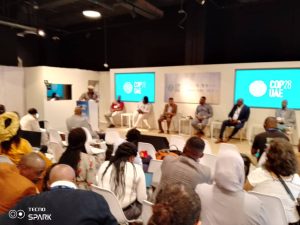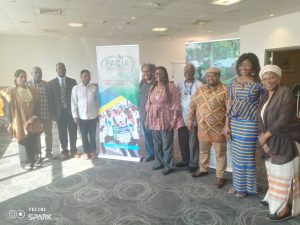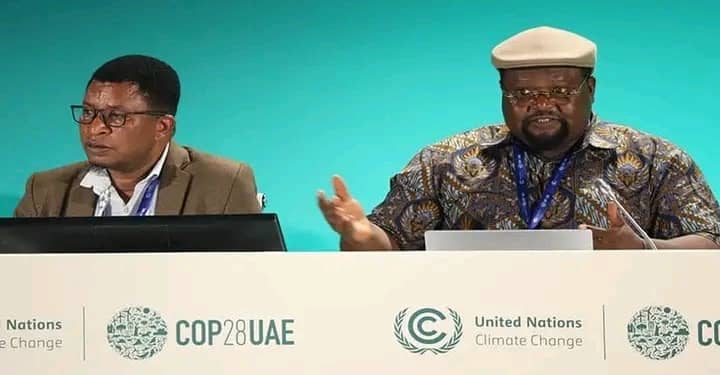By Elias Ngalame
As COP 28 begins in Dubai, November 30,2023 the Pan African Climate Justice Alliance,PACJA is seeking for transparent and just measures to address climate change challenges.
At a press conference organized by civil society actors various speakers raised concerns on the credibility and trustworthiness of the different actors on the negotiation table.
“We need to amplify the voices of the vulnerable communities in this climate change talks, that of inclusiveness, transparency and justice. The developed countries and their leaders have to show real commitment and honour their pledges,” Dr Mithika Mwenda, PACJA CEO said at the press briefing.
The African Civil Society emphasizes the importance of fairness, openness, and impartiality. They firmly urge all stakeholders to adhere to these principles to ensure that the decisions made during COP28 UAE align with the global commitment to combat climate change.
“We need a leadership that reflects these values and upholds the promise of a collective effort in addressing environmental challenges. The interest of the vulnerable communities, women, youths, indigenous population have to be protected” notes Dr Augustine Njamnshi of PACJA and CEO ACSEA.
Meanwhile at side event by PACJA prior to the official opening of COP 28, civil society actors in a panel discussion called for greater and sustainable production of a variety of minerals that are central to decarbonization in Africa.
“We have clear opportunities not only from the global green mineral boom but also from our domestic achievements, such as the African Continental Free-Trade Area to facilitate the development of regional value chains for our green economy products in Africa,” says Dr Linus Mofor, Senior Environmental Affairs Officer African Climate Policy Centre, ACPC at the panel discussion.
Africa experts say is home to multiple minerals. The Democratic Republic of Congo (DRC), for example, produces over 70% of the world’s cobalt. DRC and Zambia together supply 10% of global copper while Mozambique and South Africa hold significant reserves of graphite, platinum metals, lithium and more.
Linus Mofor deplored the fact that about 70% of the Africa’s exports are unprocessed commodities, a situation that can change with the right policies that prioritise industrialization and value-addition in mining and other resource sectors.
GOOD NEWS AT OFFICIAL OPENING

However there was some good news at the official opening of COP 28. The President of COP 28, announced loss and damage fund for vulnerable countries on the first day of the UN climate conference with a total commitment of over $420 million. The UAE host country and Germany took the lead contributing $100 million each to the fund.
“We’ve delivered history today. The first time a decision has been adopted on day 1 of any COP. And the speed at which we have done so is also historic. Getting this done demonstrates the hard work of so many, particularly members of the transitional committee who worked tirelessly to get us to this point. This is evidence that we can deliver. COP28 can deliver,” said Dr Sultan Al Jaber, president, COP28.
He said that the threshold today was to establish and operationalise a $200 million fund. “We reached north of $420 million and over the next couple of days, many more pledges are going to be made. I thank Germany, the UK, the EU, the US and Japan for their pledges earlier today,” he said.
The funds accordingly was first agreed upon during COP27, held in Sharm El Sheikh, Egypt, and became operational on Thursday November 30,2023 following the agreement reached by parties during 5 transitional committee meetings.
He said the COP28 team approached this task in a completely different and unconventional way.
“The fact that we have been able to achieve such a significant milestone on the first day of this COP is unprecedented. This is historic. The fact that we were able to get the agenda voted and agreed on without any delay is unprecedented. We have been able to deliver what was promised in Sharm al Sheikh and activate and operationalise and pass the threshold have been associated with this fund is historic.”

For Madeleine Diouf Sarr, Chair of the Group of the 46 Least Developed Countries much is still expected as outcome of the ongoing COP 28.
“COP28 is a moment to take stock of progress towards achieving the goals we all set in Paris. But we know since then, emissions have kept increasing and the impacts of climate change have intensified. The world is not on track with efforts needed to adequately address this climate crisis and the window of opportunity for limiting temperature rise to 1.5°C is rapidly closing. A meaningful decision is needed at COP28 that provides a clear path forward for deep emissions reductions and scaled up finance, which governments are held accountable to,” said at opening event.








